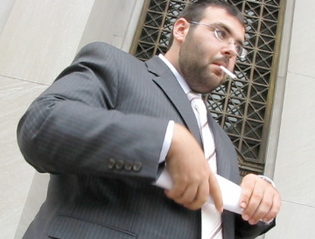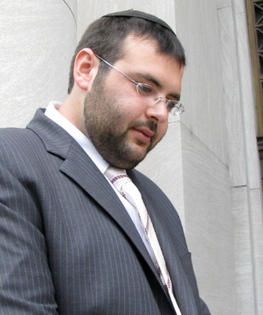 Yochanan Levitansky didn’t just swindle hundreds of thousands of dollars from eBay customers — he undermined the public’s faith in a vital institution.
Yochanan Levitansky didn’t just swindle hundreds of thousands of dollars from eBay customers — he undermined the public’s faith in a vital institution.
So argued a prosecutor in federal court Wednesday. The judge saw it the prosecutor’s way.
Levitansky, a 22-year-old New Haven man, spent most of his life studying to be a rabbi before he changed career paths and opened an electronics business on eBay. He pleaded guilty in May to defrauding over a thousand eBay customers by selling them Bluetooth headsets and cell phones that he never intended to deliver.
He pocketed $237,257 from his customers. He also made them “less likely to trust the Internet,” argued Assistant U.S. Attorney Edward Chang.
 Chang (pictured) spoke Wednesday morning at Levitansky’s sentencing hearing in U.S. District Court in New Haven.
Chang (pictured) spoke Wednesday morning at Levitansky’s sentencing hearing in U.S. District Court in New Haven.
Senior U.S. District Judge Peter C. Dorsey appeared to agree with his argument.
Dorsey argued that restitution would not be enough punishment for a man who “undermined the confidence and trust” of his customers.
Dorsey sentenced Levitanksy to 12 months and one day in prison, followed by 150 hours of community service and three years’ supervised release. He ordered him to repay $237,257, which he owes to eBay.
Levitansky took customers’ money and “walked away” from the business, Chang said. He blew the money on trips to Las Vegas, Atlantic City and Europe, according to the government prosecutors.
“It was a stupid thing to do, and Mr. Levitansky still is not sure exactly why he did it,” wrote his public defender, Sarah A. L. Merriam, in a sentencing memo.
Levitansky, who lives on Crescent Street with his parents, showed up in court in a pinstriped gray suit, a white tie and a yarmulke. He unfolded a piece of paper and delivered a brief, one-minute speech of repentance before the judge.
 “What I did was wrong,” said Levitansky (pictured). He said he had learned a lesson, to “think before I act.” He vowed to dig out of his debt.
“What I did was wrong,” said Levitansky (pictured). He said he had learned a lesson, to “think before I act.” He vowed to dig out of his debt.
“I will stand up, make my victim whole, and become a better person for it,” Levitansky said.
Career Change
Merriam gave several defenses of her client.
In a sentencing memo, she argued that his unusual background made him unequipped for the business world. Levitansky was raised in an Orthodox Jewish family in the Beaver Hills neighborhood. His parents put him through years of religious day camps, summer camps, then a Talmudical seminary in California, all in hopes that he would become a rabbi. Following his parents’ wishes after high school, he volunteered alongside a rabbi doing community outreach in Florida, then attended another Talmudic seminary in New York run by the Chabad movement.
The young man didn’t take to the line of work, however.
“Mr. Levitansky did not want to become a rabbi,” wrote Merriam. At age 18, he withdrew from the seminary. In 2007, he started his own business, Bluetooth Kings LLC.
He didn’t start out intending to scam anyone, Merriam argued: Levitansky just got in over his head. By May 2008, the orders were rolling in with such volume that the young man couldn’t handle it.
“Things quickly got out of hand, and Mr. Levitansky became completely overwhelmed,” Merriam wrote. “As a young man who had been raised with the idea that he would one day become a rabbi, Yochi Levitansky was ill-prepared for the challenges of running a business on his own.”
The impact of the fraud was softened, she argued, by eBay’s insurance policies. When he failed to make deliveries, Levitansky knew eBay would pay the customers back.
“He knew he would owe money to eBay, and he figured he would sort that out with the company,” she wrote.
Levitansky tried to do so — he even paid back $30,000 in listing fees, but when he couldn’t pay the rest of the $237,257, the case landed in criminal court.
In defense of her client, Merriam said the case was “solely about money.” She said the case was really a civil matter, and that the debt owed to eBay was a drop in the bucket compared to the company’s profits. She argued that the behavior was extremely out-of-the-ordinary for the young man, who has no prior criminal record and comes from a supportive, educated family.
Merriam said her client intends to fully pay the company back — he already got a job as a maintenance worker, fixing sinks to dig out of debt. Levitansky can pay it back quicker if he can stay employed instead of going to prison, she argued. She urged the judge for probation instead of prison, arguing that the quarter-million dollar restitution would be sufficient punishment.
Chang didn’t agree.
The case was about much more than money, he argued — it’s about the foundation of the Internet marketplace.
As more people turn to the Internet to buy goods, they need to be able to have faith that anonymous sellers won’t rip them off, Chang argued. Though the customers Levitansky swindled have mostly been repaid by eBay, he said, “they will have the memory of being defrauded.”
The scheme not only damaged eBay, he said. It damaged the Internet.
Levitansky came from a good family and got a good education, Chang added: “He really knew better.”
Dorsey said while a longer prison sentence wasn’t necessary, Levitansky does need some prison time to teach him respect for the law and to deter him from repeating the crime.
“That’s a lot of money,” the judge said of the swindled $237,257. He called the defendant “well short of Bernie Madoff, but somewhat tracking in that same direction.”
He ordered Levitansky to surrender to prison on Oct. 16, and to pay back $300 per week in restitution once he’s employed.
After receiving his sentence, Levitansky lit a cigarette on the courthouse steps.
“No comment,” he said.






Doesn't surprise me.